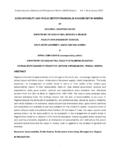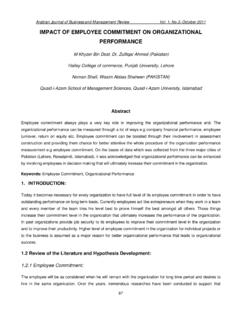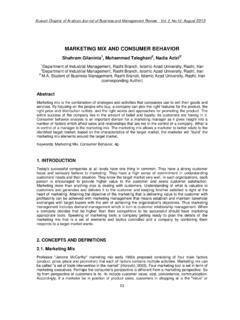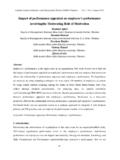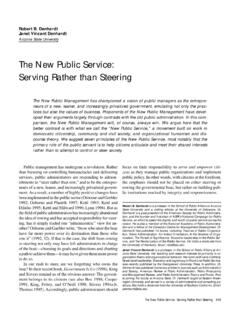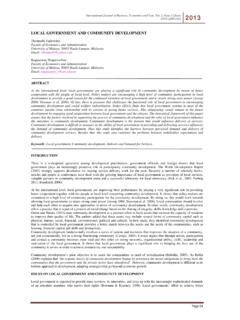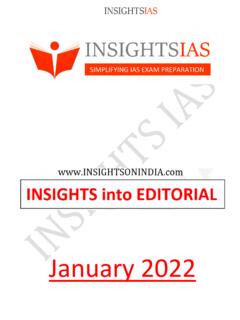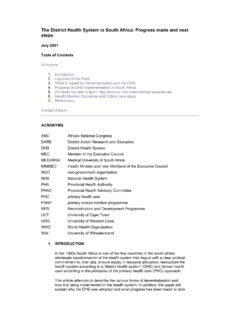Transcription of RATIONAL CHOICE THEORY: ASSUMPTIONS, STRENGHTS, …
1 Arabian Journal of Business and Management Review (Nigerian Chapter) Vol. 1, No. 3, 2013 90 RATIONAL CHOICE theory : assumptions , STRENGHTS, AND GREATEST WEAKNESSES IN APPLICATION OUTSIDE THE WESTERN MILIEU CONTEXT. Michael I. Ogu Department of Political Science and public administration Babcock University, Ogun State, Nigeria Abstract This study reviewed the origin of the RATIONAL CHOICE theory and how it came to be adopted as one of the major approaches or paradigms of analysis in the political science sub-field of contemporary political analysis, its basic hypothesis, underlying assumptions , and criticisms of the theory as well as application areas outside the western milieu context.
2 The study adopted the qualitative approach to research, and referenced scholarly text books, articles, journals and monographs in the areas under investigation. The theory arguably, begins, from the viewpoint of the individual, as against viewing various individuals interacting and relating together, social situations, or groups. The emphasis on the individual interest has always been the starting point of the theory , even though some scholars have argued to the contrary. Despite the steps involved in reaching RATIONAL decisions, choices and decisions are made simply b y muddling through , as long as the decision made would likely lead to the perceived best possible outcome.
3 Individuals hardly follow the steps provided in the RATIONAL model to reach decisions that they regard as RATIONAL . Rationality hence is a subjective phenomenon, since an individual from time to time can be both RATIONAL and irrational in reaching decisions. Keywords: RATIONAL CHOICE , Hypothesis, assumptions , Muddling through. Word Count: 197 1 INTRODUCTION The RATIONAL CHOICE theory , also known as CHOICE theory or RATIONAL action theory , is a theory for understanding and often modelling social and economic as well as individual behaviour.
4 It is the main paradigm in the currently-dominant microeconomics school of thought. It is also central to modern political science, as well as other disciplines such as sociology and philosophy. Becker (1976) recorded that the RATIONAL CHOICE theory was early popularized by a 1992 Nobel Memorial Prize Laureate in Economics Science, Gary Becker, who was one of the first to apply RATIONAL actor models more widely . Elster (1989) stated the essence of RATIONAL CHOICE theory when he said that when faced with several courses of action, people usually do what they believe is likely to have the best overall outcome.
5 The rationality defined by the RATIONAL CHOICE theory adopts a more specific and narrower definition, which simply means that an individual acts as if balancing costs against benefits to arrive at action that maximizes personal advantage. (Friedman, 1953) The RATIONAL CHOICE theory is argued to be the result of the envy of other disciplines on economics, and its principles of CHOICE in human behavior. Scott (2000) asserts; It has long appeared to many people that economics is the most successful of the social sciences.
6 It has assumed that people are motivated by money and by the possibility of making a profit, and this has allowed it to construct formal, and often predictive, models of human behaviour. This apparent success has led many other social scientists to cast envious eyes in its direction. They have thought that Arabian Journal of Business and Management Review (Nigerian Chapter) Vol. 1, No. 3, 2013 91 if they could only follow the methods of economics they could achieve similar successes in their own studies. These sociologists and political scientists have tried to build theories around the idea that all action is fundamentally ' RATIONAL ' in character and that people calculate the likely costs and benefits of any action before deciding what to do.
7 This approach to theory is known as RATIONAL CHOICE theory , and its application to social interaction takes the form of exchange theory . In politics, as well as economics, there is always the competition for scarce resources. Since the 1950s, the semblance between market competition for goods and political competition for power and its privileges has given a large number of scholars, especially social scientists, the impression that the economic methods could also be usefully applied in the study of politics. James Buchanan and Gordon Tullock (1974), in their book, The Calculus of Consent: Logical Foundations of Constitutional Democracy, stated that in the study of political science, one assumes, that the representative or the average individual acts on the basis of the same over-all value scale when he participates in market activity and in political activity.
8 Tullock (1976) affirmed this when he asserted that Voters and customers are essentially the same people. Mr. Smith buys and votes; he is the same man in the supermarket and in the voting booth. Barry Weingast, a Stanford University professor, in Shapiro (2006) said " RATIONAL CHOICE has come quite a way. Thirty years ago, it was far outside the mainstream in political science in almost every respect." Terry Moe also in Shapiro (2006) said that RATIONAL CHOICE had taken the discipline of political science "by storm.
9 " Moe stated two reasons for this: first, it had huge analytical strengths. Secondly, more than a methodology, he said, RATIONAL CHOICE was "a family of theories" or "a technology for developing theories." RATIONAL CHOICE theory is an approach that could be used by social scientists to understand human behavior. Green (2002) identified that the spread of the RATIONAL CHOICE approach beyond conventional economic issues is discussed by Becker (1976), Radnitzky and Bernholz (1987), Hogarth and Reder (1987), Swedberg (1990), and Green and Shapiro (1996), among others.
10 OBJECTIVE OF THE STUDY The following are the objectives aimed at by the study; 1. To review the origin of the RATIONAL CHOICE theory and how it came to be adopted as one of the major approaches or paradigms of analysis in the political science sub-field of contemporary political analysis. 2. To identify the theory s basic hypothesis, assumptions , and major areas of application of the theory in the social science. 3. To attempt a critique of the approach, bringing out the strengths and weaknesses. 4. To draw conclusion from the foregoing analysis.
